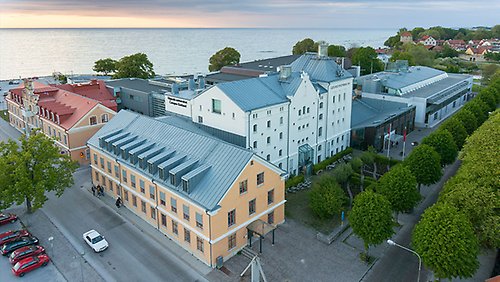Bachelor's Programme in Energy Transition – Sustainability and Leadership
180 credits

Of all global greenhouse gas emissions, 70 per cent come from the production and use of energy. Transformation of our energy systems is therefore urgent. The Bachelor’s Programme in Energy Transition – Sustainability and Leadership will train you to understand and combine knowledge from various academic fields to address complex issues relating to energy, transition processes and sustainability. You will study both technical and social science subjects as part of the programme.
Autumn 2023 Autumn 2023, Visby, 100%, On-campus, English
- Location
- Visby
- Pace of study
- 100%
- Teaching form
- On-campus
- Instructional time
- Daytime
- Start date
- 28 August 2023
- Language of instruction
- English
- Entry requirements
-
General entry requirements for first-cycle (Bachelor's level) studies in Sweden. Also required is:
- advanced level mathematics (equivalent of Swedish course Mathematics 3b or 3c/Mathematics C);
- intermediate level natural sciences (equivalent of Swedish course Natural Sciences 2); and
- basic level social sciences (equivalent of Swedish courses Social Sciences 1b or 1a1+1a2).
Proficiency in English equivalent to the Swedish upper secondary course English 6. This requirement can be met either by achieving the required score on an internationally recognised test, or by previous upper secondary or university studies in some countries. Detailed instructions on how to provide evidence of your English proficiency are available at universityadmissions.se.
- Selection
-
Students are selected based on:
- their completed upper secondary (high school) grades (66%)
- Swedish Scholastic Aptitude Test (34%)
Students who have completed their upper secondary (high school) studies outside of Sweden are selected based on their upper secondary grades. Students who have completed their upper secondary studies and have taken the Swedish Scholastic Aptitude Test (only available in Swedish) are selected based on their upper secondary grades and their Scholastic Aptitude Test results.
Tuition fee-paying students and non-paying students are admitted on the same grounds but in different selection groups.
- Fees
-
If you are not a citizen of a European Union (EU) or European Economic Area (EEA) country, or Switzerland, you are required to pay application and tuition fees.
- Application fee: SEK 900
- First tuition fee instalment: SEK 65,000
- Total tuition fee: SEK 390,000
- Application deadline
- 16 January 2023
- Application code
- UU-K1810
- Additional information
-
Read more about Bachelor's level entry requirements and the application procedure.
Autumn 2024 Autumn 2024, Visby, 100%, On-campus, English
- Location
- Visby
- Pace of study
- 100%
- Teaching form
- On-campus
- Instructional time
- Daytime
- Start date
- 2 September 2024
- Language of instruction
- English
- Entry requirements
-
General entry requirements for first-cycle (Bachelor's level) studies in Sweden. Also required is:
- advanced level mathematics (equivalent of Swedish course Mathematics 3b or 3c/Mathematics C);
- intermediate level natural sciences (equivalent of Swedish course Natural Sciences 2); and
- basic level social sciences (equivalent of Swedish courses Social Sciences 1b or 1a1+1a2).
Proficiency in English equivalent to the Swedish upper secondary course English 6. This requirement can be met either by achieving the required score on an internationally recognised test, or by previous upper secondary or university studies in some countries. Detailed instructions on how to provide evidence of your English proficiency are available at universityadmissions.se.
- Selection
-
Students are selected based on:
- their completed upper secondary (high school) grades (66%)
- Swedish Scholastic Aptitude Test (34%)
Students who have completed their upper secondary (high school) studies outside of Sweden are selected based on their upper secondary grades. Students who have completed their upper secondary studies and have taken the Swedish Scholastic Aptitude Test (only available in Swedish) are selected based on their upper secondary grades and their Scholastic Aptitude Test results.
Tuition fee-paying students and non-paying students are admitted on the same grounds but in different selection groups.
- Fees
-
If you are not a citizen of a European Union (EU) or European Economic Area (EEA) country, or Switzerland, you are required to pay application and tuition fees.
- Application fee: SEK 900
- First tuition fee instalment: SEK 65,000
- Total tuition fee: SEK 390,000
- Application deadline
- 15 January 2024
- Application code
- UU-K1810
- Additional information
-
Read more about Bachelor's level entry requirements and the application procedure.
About the programme
The Bachelor's Programme in Energy Transition – Sustainability and Leadership provides a holistic perspective on the field of energy, with a broad understanding of various challenges and potential approaches to the transition work. The programme also addresses social perspectives such as participation and change leadership, which are necessary for efforts to promote long-term sustainability on both a global and local level.
The programme focuses on renewable energy and energy efficiency about sustainability objectives. In this process, there is a major need for people who have interdisciplinary expertise and can communicate and work together with various stakeholders across disciplines. You will be trained to critically analyse and evaluate the energy transition from a variety of perspectives, including through active student participation. This will prepare you to work with various experts and interest groups, such as engineers, planners, economists and environmental scientists.
During the programme, you can expect to:
- Get a broad interdisciplinary understanding of challenges and solutions related to sustainable energy transitions.
- Have the ability to lead and coordinate transition projects working with actors from various sectors.
- Get the knowledge and skills to have a career working with energy and sustainable development issues in the private or public sector, or to deepen your knowledge with further academic studies.
Student profile
You are interested in energy and sustainability issues and want to help bring about change in respect of energy issues. You will be studying with students from a variety of countries with different backgrounds. This diversity supports the interdisciplinary and international nature of the programme. The student group is made up of a relatively small class, thereby facilitating active learning. You are expected to play an active part in the learning process and be prepared to work as part of a group and communicate and interact with various stakeholders in the community.
Degree
The programme leads to the degree of Bachelor of Science with Sustainable Energy Transition as the main field of study.
Content
The programme focuses on three areas: sustainable energy transition, environmental science, and industrial engineering with an emphasis on leadership. These may later form subsidiary fields as part of your degree.
Year 1
The first year will provide you with a broad understanding of the field of sustainable energy transition. The emphasis is on energy, energy systems and the three dimensions of sustainability: ecological, social, and economic. Studies looking at projects and leadership, as well as academic methods, are introduced early on so that you can apply them throughout the programme.
Year 2
In your second year, you will develop your skills in understanding, analysing and managing a sustainable energy transition using an interdisciplinary approach. Your expertise will be broadened using courses in the subsidiary field of environmental science. This will give you perspectives on urban planning and environmental justice, as well as environmental economics.
Year 3
You can choose from a variety of courses in the first semester of your third year, either studying at Uppsala University or pursuing exchange studies at one of our partner universities. You also have the option of obtaining a placement during this semester.
We will be focusing on the academic method and your degree project in the final semester.
Courses within the programme
Learning experience
The programme is built on two important cornerstones: active student participation and an interdisciplinary approach. You will learn how to deal with challenges when working with sustainable energy transition, and the programme combines theoretical and practical studies. Practice in written and verbal communication skills, as well as learning as part of a group, are key to this programme.
Grading and assessment will be customised to fit the content of each course and its goals. This means that summative assessment methods vary, and your skills and abilities will be assessed through various verbal and written forms, both individually and as part of groups.
All courses in the programme are given in English and the student group is international.
Study at Campus Gotland
The programme is offered in Visby, at Campus Gotland, part of Uppsala University. This gives you the best of both worlds. The scope and weight of the university in the fields of education and research, as well as the unique study environment offered by a smaller campus with a clear emphasis on sustainability.
Career
This programme is recommended for anyone motivated to work in the rapidly growing field of energy transition, where there is a pronounced need for interdisciplinary skills. There are job opportunities at national and international companies (such as energy companies, energy agencies and consultancies), organisations, and authorities at various levels. The following professions are in demand in the world of work:
- Sustainability specialist,
- Energy strategist,
- Energy and environmental compliance officer,
- Energy and environment communications officer,
- Consultant,
- Advisor (in politics and business, for instance).
This programme provides opportunities for further studies at the Master's level in Sweden and abroad. At Uppsala University, there are several international Master's programmes which would serve as a natural continuation of the Bachelor's programme in Energy Transition – Sustainability and Leadership.
"Renewables are directly supporting broader socio-economic objectives, with employment creation increasingly recognised as a central component of the global energy transition. As the scales continue to tip in favour of renewables, we expect that the number of people working in the renewables sector could reach 24 million by 2030, more than offsetting fossil-fuel job losses and becoming a major economic driver around the world."
- General Adnan Z. Amin, IRENA Director.
Career support
During your time as a student, UU Careers offers support and guidance. You have the opportunity to take part in a variety of activities and events that will prepare you for your future career.
Is this programme right for you?
Read interviews about the programme.

Study in Visby
What is it like studying at Campus Gotland?

Register your interest
Keep updated about the application process.

Contact
- For study counselling, please contact Student service Campus Gotland:
- studievagledning-cg@uu.se
- For admissions-related or general information, please contact our applicant support team:
- undergraduate@uu.se
Students
As a student you will find information about your studies in the student gateway.
